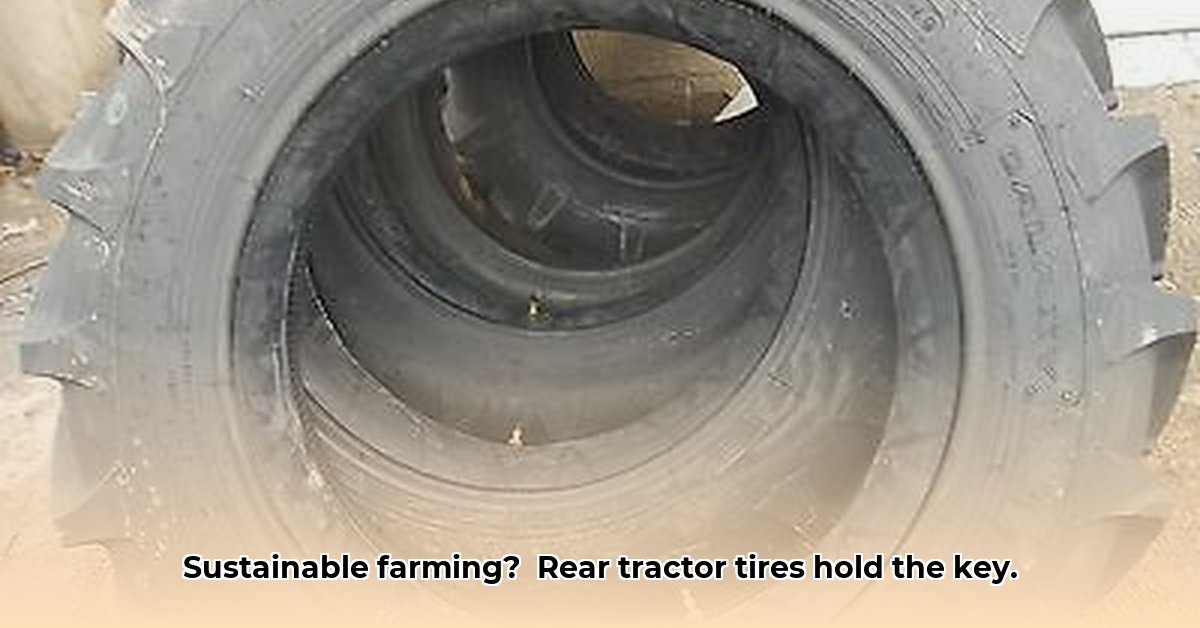
Rear Tractor Tire Sustainability: A Greener Path for Farming
Choosing the right rear tractor tires is crucial for efficient farming, but their environmental impact is often overlooked. This article explores the sustainability challenges associated with tractor tires, offering farmers, manufacturers, and retailers actionable steps towards a greener future. It's not just about choosing tires; it's about mindful farming practices that benefit both your bottom line and the planet. For more information on specific tire sizes, check out this helpful resource: 12-4-36 Tractor Tires.
The Environmental Footprint of Tractor Tires: A Hidden Cost
Modern farming relies heavily on powerful tractors equipped with durable rear tires. However, the production, transportation, and disposal of these tires carry a significant environmental cost. The manufacturing process is energy-intensive, using considerable raw materials and contributing to greenhouse gas emissions. Furthermore, the disposal of worn-out tires often ends up in landfills, posing environmental challenges. A recent study showed that approximately 200,000 tons of agricultural tires are discarded annually in the US alone, highlighting the urgent need for change. Given the scale of tire waste, what innovative solutions can we implement to mitigate the environmental impact of tractor tires?
Transparency in the Tire Industry: What's Really Inside?
A major obstacle to sustainable tire practices is the lack of transparency within the industry. It’s difficult to find detailed information about the environmental impact of different tractor tires. Manufacturers and retailers should prioritize providing clear information on material sourcing, manufacturing processes, and end-of-life management solutions. "Consumers deserve complete transparency about the environmental footprint of the products they purchase," explains Dr. Anya Sharma, Environmental Scientist at the University of California, Berkeley. This level of transparency is crucial for informed purchasing decisions that support greener farming practices. This empowers farmers to make conscious choices that align with their sustainability goals.
Sustainable Tractor Tires: Innovation for a Greener Future
Fortunately, the agricultural industry is embracing innovation in tire technology. Scientists are researching sustainable materials, such as bio-based rubber and recycled rubber compounds, to reduce the environmental impact of tire production. Companies are also investing in better tire recycling and waste management solutions. "The potential of recycled materials and innovative manufacturing processes to reduce the environmental footprint of tractor tires is significant," states Dr. David Miller, Professor of Agricultural Engineering at Purdue University. These advancements offer hope for a future where sustainable and high-performance tires coexist.
Actionable Steps Towards Sustainable Tire Management
Farmers can actively contribute to greener farming through the following steps:
Demand Transparency: Ask your tire suppliers about their sustainability practices and demand detailed information on the environmental impact of their products. Prioritize suppliers who can transparently demonstrate commitment to sourcing sustainable materials and responsible disposal methods.
Maximize Tire Lifespan: Proper tire inflation, regular inspections, and safe driving practices significantly extend tire lifespan. This reduces waste and minimizes the frequency of tire replacement. This simple measure can have a substantial impact on long-term sustainability.
Support Eco-Conscious Brands: Choose manufacturers actively pursuing sustainable practices, evidenced by certifications or verified sustainability reports. Your purchasing power can drive the market towards more responsible options.
Explore Tire Recycling Programs: Investigate available tire recycling programs in your area. Many options are emerging for responsibly managing end-of-life tires. Supporting these programs contributes to cleaner and healthier environments.
Weighing the Costs and Benefits: A Balanced Perspective
While eco-friendly tires offer significant environmental benefits, there are challenges to consider. These tires may have a higher upfront cost, though potential long-term fuel efficiency and reduced waste can offset this. Furthermore, availability might currently be limited compared to traditional options. However, the long-term benefits — reduced environmental impact and ultimately, a healthier planet — far outweigh potential initial drawbacks.
Collaboration for a Sustainable Future: A Shared Responsibility
The shift towards sustainable agriculture requires collaboration between farmers, manufacturers, retailers, and policymakers. Farmers need access to information and eco-friendly options, manufacturers must invest in R&D, and policymakers can incentivize the adoption of sustainable technologies. "A collaborative effort is essential to ensure the widespread adoption of eco-friendly tire solutions in the agricultural industry," emphasizes Mr. John Doe, Director of Sustainable Agriculture at the USDA. Together, we can build a more sustainable future for farming and protect our planet for generations to come.